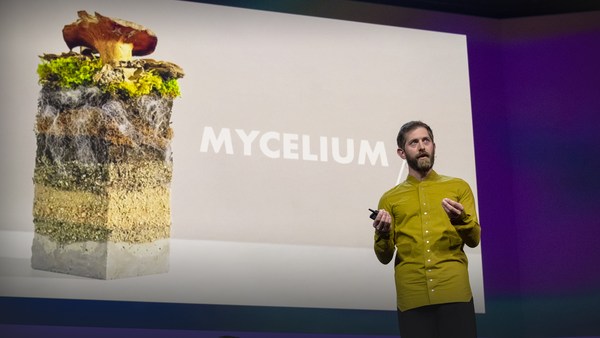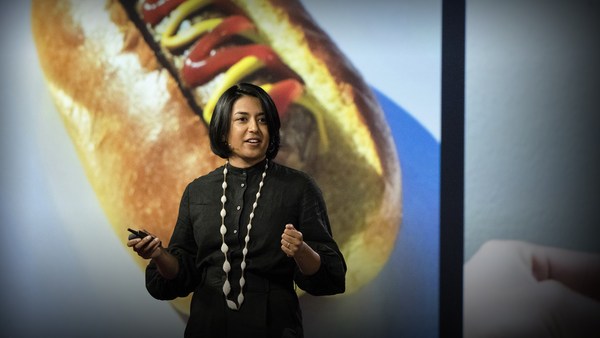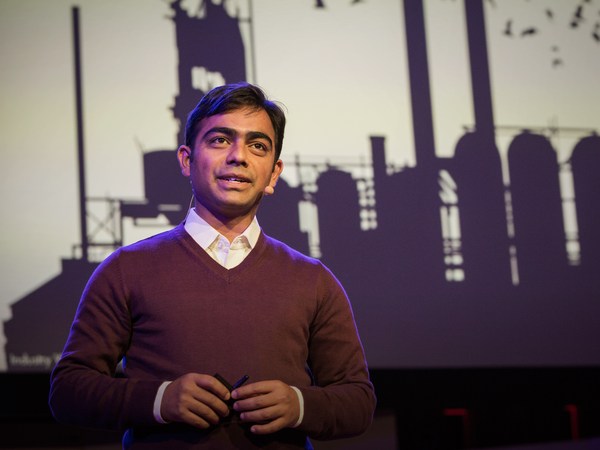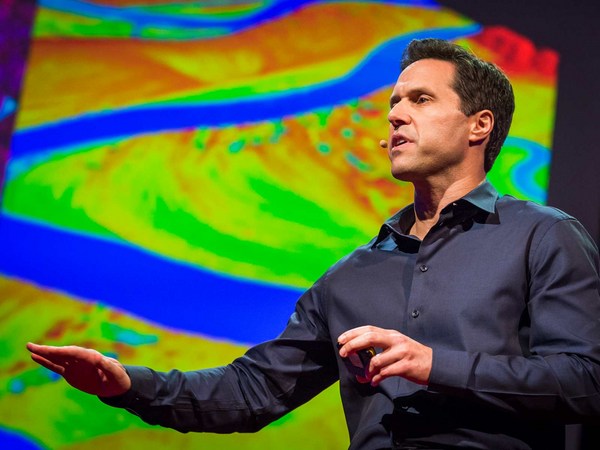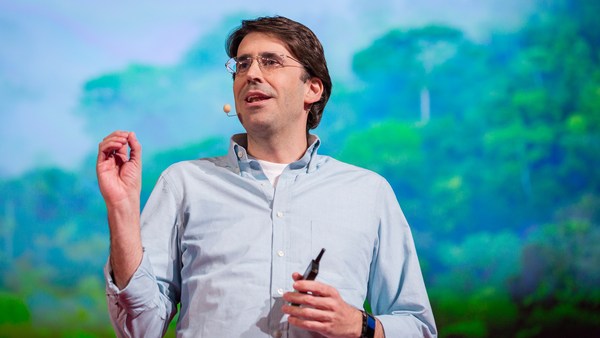Perhaps it's surprising that as a professional tree hugger, I'm going to be speaking to you about supply chains. They don’t sound very sexy, but when it comes to stabilizing our climate, supply chains are the hottest topic on the planet.
And that's because more than half of our society's carbon footprint can be attributed to the impact of supply chains and specifically the raw materials that products are made from. We have built our societies around take-make-waste production systems: the fossil fuel industry, plastics, industrial forestry and paper. These are massive global supply chains that have shaped our world. They've left deep scars across landscapes, legacies of pollution and push species and cultures to the brink of extinction.
Now, on the other hand, we have game changing solutions, brilliant innovations that use 90 percent less water and 50 percent less energy. But they’re stuck at small scale because they can’t secure the financing that they need to commercialize nor the markets that underpin their success. It's the classic chicken and egg situation. And even with slow progress, we're losing ground to the climate crisis and biodiversity loss. This at a moment when we need all hands on deck for our planet. We must scale solutions and we must scale them quickly. And this is not just about doing less bad. That time has passed. We need the 2.0 industrial revolution, one that sets us on course to operate and live within the natural bounds of our planet.
And so overhauling these huge and powerful, entrenched industrial systems, it can appear daunting. But I've seen how change can be successful up close with the work that I’ve been doing for the past 20 years. For my organization, Canopy, our focus is on protecting the world’s ancient and endangered forests and transforming the massive pulp paper packaging and viscose supply chains.
But the principles from those supply chains can be applied to any sector in need of change. Keeping forests standing is one of the fastest, cheapest, most effective ways for us to stabilize our climate. But of course, we can’t keep forests standing if we keep mowing them down to make pizza boxes and rayon T-shirts. The surge in e-commerce and fashion derived from tree-based textiles like rayon and viscose is driving the destruction of climate-critical forests and creating mountains of discarded textiles and packaging.
We must move our supply chains out of forest ecosystems, and to do that, we need to change the business practices of thousands of brands. And that's where we come in.
Canopy works to create the market conditions for change by working with hundreds of the forest industry’s largest customers. First to eliminate the use of ancient and endangered forest fiber from their packaging and their textile supply chains. And now increasingly to introduce lower carbon circular Next Gen alternatives. Get rid of the bad, phase in, scale up the good.
These companies are often fierce competitors in the rest of their business operations, but they’re willing to come together in a pre-competitive space because they know that no single company, no matter how large they are, can transform an entire supply chain by themselves, nor can they solve the climate crisis. And the CEOs of these companies’ suppliers, giant companies responsible for 90 percent of global viscose production and half of packaging, can sit around a single boardroom table. Imagine that. The outsized influence of this small group of suppliers can unlock ambitious levels of change through their collective supply chains. And of course, the same can be said for other sectors as well.
Supply chain transformation starts when you have a critical mass of brands telling their suppliers that they need to change, that they have zero tolerance for packaging and textiles that originate from the world's endangered forests, that they want lower carbon, circular, Next Gen alternatives and giving their suppliers a short timeline to achieve that target. And this strong market pull through for low carbon alternative creates the value proposition for conventional producers to change business-as-usual practice, to fund the new tech, to develop the systems to replace tree fiber with these low carbon, more circular feedstocks like discarded clothing and agricultural residues, and then to build the systems to make sure that these new feedstocks can then make their way to the new Next Gen pulp mills. At Canopy, we call this strategy “Survival: A pulp thriller.”
(Laughter)
(Applause)
Thank you. So industry leaders demand change, suppliers respond. It creates value that moves investment. The pipeline of solutions is buoyed, and you have a supply chain well on its way to sustainable change.
Canopy’s early work greening the Harry Potter book series has grown to working with brands that represent $1 trillion. These companies are changing the packaging and the viscose textiles that they're buying based on the environmental qualities, and it is this leverage that has enabled us to shift more than half of global viscose out of the world's ancient and endangered forests.
(Applause and cheers)
And now we're working with our brand partners, with conventional producers, with investors and with brilliant innovators to scale climate resilient supply chains for the 21st century. And in fact, the world’s first Next Gen mill is now up and running. It's a giant industrial mill built in the bones of an old shuttered wood mill in northern Sweden. And rather than requiring huge swaths of forest to be cut every year, Renewcell will use hundreds of millions of old jeans and T-shirts. It's re-employed 100 people. It uses 90 percent less water and five tons less carbon per ton of product compared to a conventional tree-based rayon.
Renewcell is a spectacular swords to ploughshares example and it is the first of hundreds of Next Gen mills that are on track to be operational by 2030 as our strategy unfolds and boosted by the generous support of the TED community.
It’s heartening and remarkable to see the viscose supply chain transforming in real time and proving that solutions are indeed sexy. But it mustn't stop there because many of our production systems and supply chains are unsustainable and in need of change. The food system, plastics, paper-based packaging. For every sector, there is a more sustainable path forward and the solutions and the people needed to make them happen are often closer than we think. When we create the right market conditions, change can happen exponentially and quickly.
Carbon intensive supply chains are relics of the 20th century. Let’s leave them back there.
Thank you.
(Applause)
